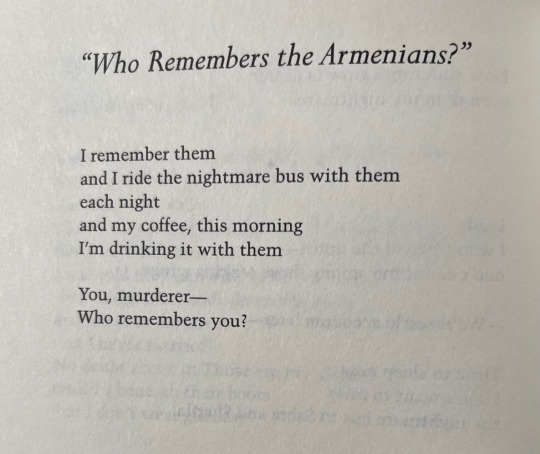Hello all, this is a side blog for personal content I don't wish to mix with my fandom posts
Don't wanna be here? Send us removal request.
Text
do something good today.
call your loved ones, speak to them. listen to a new album from band you've heard about but didn't have time to get into. water your plants. draw a cat. but please don't give up, and keep living.
9K notes
·
View notes
Text
Aya, one real struggle of healing from a socially anxious and therefore largely friendless childhood is that few well-adjusted adults seem to be willing to deal much with my fledgling friend-relationship skills once they start to peek through. And those that do are more often that not in a similar position to myself, which makes the dynamics that much more difficult.
I definitely understand why someone who has matured relationship skills would prefer to maintain friendships with others who are similarly capable, but ah... it does hurt to be seen as not worth the effort. To be fair I've made a few good friendly acquaintances so far with others who are also on the fringes for some reason or the other, but I kinda feel like I'm learning more about what to avoid than what to do right.
0 notes
Text
I really struggle with the 'just practice' part of working through social anxiety and improving social skills. Speaking with strangers is it's own thing and I've reached a decent level of comfort there, but learning to build rapport and relationships with other people is the hard part. Usually the advice for improving socially is that it's ok to fail, but with the kinds of people I'm around enough to try building relationships with... do I really want to try while my failure rate is so high? There just aren't many groups of people I'm around enough to try establishing rapport with, and the idea of messing up enough to give them bad impressions of me and leaving no one I actually want to acquaint myself with is nerve-wracking. It's happened before in workplace situations, and while yes I can improve over time it leaves that permanent trail of awkwardness. You just can't undo a serious of failed social interactions and it seems to leave any relationships that I manage to develop with them later feeling tainted.
0 notes
Text
People who, when feeling angry or wronged, lash out at you in punishment to make you hurt, then get further angry or even offended if you react to that hurt with anything other than meekness and submission, really frustrate me. Just what on earth is that logic? I know things are more complicated if you actually did something to wrong them and they're retaliating, but in general I don't get the attitude that they can and should be able to decide what emotions you're allowed to feel about it, as if you're a machine that they hold the levers to. That you should hurt only as long as they want to you, stop when they're satisfied with it, and don't internalize or manifest pain in a manner that inconveniences them in any way. That if you break from any of these requirements, you're a bad person.
It's obviously misplaced to think you can wrong someone and they're not allowed to react to it. But if they react in a way that genuinely deeply hurts you but demand a continued relationship while refusing to acknowledge lasting harm done, or otherwise act like your hurt is meaningless because they hurt first... it really damages the connection.
#retaliation#punishment#I just have very complicated feelings about punishment#probably from having been raised in a home with vindictive and authoritarian ideas about it#have always been sensitive and prone to shame so mean-spirited retaliation really affects me deeply
0 notes
Text

Hubble Views the Dawn of a Sun-like Star by NASA Hubble Space Telescope
3K notes
·
View notes
Text
parent: sees child doing something undesirable and asks why they're doing it
parent: *known to punish child when they say something the parent doesn't like*
child: says what they think parent wants/expects to hear instead of the truth
parent: is outraged at the audacity and punishes anyways
0 notes
Text
Posting on my side for privacy reasons, but I feel like the general advice of just putting yourself out there online to make friends has never worked for me. The result has been pretty consistently been no interaction if I post something original, then if I reply to someone either no response or a cursory and neutral one with no followup if I reply back.
Really struggling to tell if I'm just not saying the right things or if there's something else wrong. It's really disheartening since I find it hard to meet people IRL and now it feels that even the web isn't a viable avenue. Trying not to give up rn but it can be hard.
1 note
·
View note
Text
just saw someone on reddit reassure this woman by saying “so sorry you’re only coming across bisexuals to date, i hope you find someone in the end”
just in: bisexuals are not people and it’s insulting to have us in your dating pool :D
but when bisexuals say something there’s all this crying i hear idccc
22 notes
·
View notes
Text
re: why is radblr ‘like that’?
so recently i’ve been seeing some discourse among bisexual users in/orbiting the radblr space regarding its profoundly biphobic (and homophobic) culture. why is radblr hostile to bisexual women? why are lesbians and bisexual women constantly at odds? is this feud manufactured by outside influence? or is it inherent to the space? @watermelinoe wrote a great nuanced response to an anon who attempted to antagonize lesbian users. i agree with everything that was said, but i don’t think placing the fault on black-pill infiltrators and politically unserious edgy teenagers is the full story. this post is mostly in addition to that reply, but i figured i should create a separate post for my lengthy thoughts.
for context: i’ve been working on a detailed post about the history and politics of the lesbian feminist movement (i.e. the political lesbian branch of feminism), as it is apparent to me that most of radblr is uninitiated due to how frequently its users conflate radical feminist principles and lesbian feminist principles. i still might finish that post at some point in the future, but i thought i should put some of the information i’ve come across while researching for that post out there now since it's become relevant.
one of the readings i found to be crucial in understanding how the culture of radblr enables biphobia (and lesbophobia) is sharon dale stone’s “bisexual women and the ‘threat’ to lesbian spaces: or what if all the lesbians leave?” (x) the title is inflammatory, but i highly recommend giving her paper a read. stone authored it in 1996 as a reflection on the culture of the canadian lesbian/cultural feminist spaces she was an active member of in the 1970s-1980s and provides a truly fascinating look into a niche community that i consider to be a spiritual predecessor of radblr.
the paper is quite dated in many regards. the most obvious being stone’s use of ‘lesbian’ to mean both ‘homosexual female’ (which is the only and rightly so accepted meaning of the word today in radblr) and the political ‘lesbian’ identity, of which the philosophy for is outlined as follows:
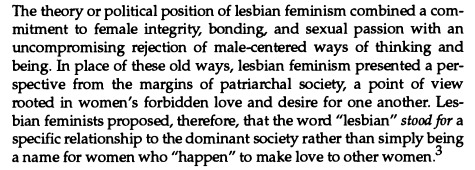
it was entirely possible to be a true female homosexual, or female bisexual, or even female heterosexual and be a ‘political lesbian’ and active member of communities like stone’s house on jarvis street. stone says that those voicing opposition to lesbianism as a choice were the minority, but i think this was largely the case because ‘lesbianism’ meant different things to different groups and organizations of cultural/lesbian feminists at that time. the reason i am reluctant to dismiss lesbian involvement in these spaces is because they were mostly born of lesbian (and bisexual) exclusion from other more mainstream feminist spaces and organizations by homophobic heterosexual feminists, as well as the marginalization lesbian (and bisexual) women in the gay liberation movement experienced due to lack support against misogyny by male counterparts. i am also reluctant to dismiss straight women’s involvement in these spaces because even into the late 1980s, lesbianism was conceptualized by many cultural/lesbian feminists as not needing a sexual component at all; all that was required from women to live a ‘lesbian’ lifestyle was prioritizing closeness and connections with other women and eschewing relationships with men (akin to radblr's idea of practicing 'micro-separatism' in one's day-to-day life in lieu of not being able to move to a women's land full-time). from my understanding, 'lesbianism' and 'female homosexuality' were not thought of as synonymous, which is why 'lesbianism' was considered a voluntary political philosophy, even by many female homosexual feminists.
all that said, stone’s descriptions of the jarvis house culture are very reminiscent of radblr culture (down to the usage of slang terminology like ‘gomer’ for men, the radblr equivalent being ‘nigel’ and ‘jakey’). this is because radblr culture is heavily inspired by cultural/lesbian feminist values, not radical feminist values. while both schools of feminism share similarities, lesbian/cultural feminism deviates significantly in its emphasis of separatism as the solution to the male supremacy and patriarchy present in all levels of society. meanwhile, radical feminism calls for a fundamental restructuring of society to eliminate women's oppression. radical feminism was never about female separatism. radblr culture is biphobic because female separatism 'as the solution to female oppression' will always require a politicization and objectification of female sexuality.
i normally wouldn't cite wikipedia articles as sources, but this distinction is outlined on the very top of the entries for radical feminism and lesbian/cultural feminism:


as an aside, this is why i find it very funny when radblr users try to 'kick out' other radblr users from the radical feminist club, because the beliefs these users are being kicked out for not holding (i.e. separatism as the means to female liberation), are conclusively NOT radical feminist beliefs. they are lesbian/cultural feminist beliefs!
the script of political lesbianism that radblr holds is "non-lesbian who believes inaccurately adopting the lesbian label is feminist action, therefore giving credence to the homophobic notion that lesbianism is an active, politicized identification choice, or born out of experiencing trauma from men, instead of a politically neutral, natural sexuality that some women experience." and yes, that is a large and significant aspect of why political lesbianism is harmful (and uniquely so to lesbians). but it also goes deeper than that. in truth, this definition is only surface-level. all women in feminist spaces can be guilty of holding and perpetuating polilez beliefs, and this rhetoric dehumanizes ALL women. through the political lesbian perspective, women's capacity for feminist action is made and broken by her sexual behavior - namely, her exclusion or inclusion of males from her sexual behavior - and by extension, her reproductive decisions (i.e. remaining childfree or birthing children 'for a man.') this is where the core harm of radblr's covert political lesbian rhetoric lies.
saying or implying that:
motherhood is compliance to patriarchy
engaging in relations with men is compliance to patriarchy
bisexual women have a moral imperative to only date women in order to defy patriarchy, and if they reject this, they are in kahoots with the patriarchy
patriarchy is defined by "sexual access" to women
lesbians are intrinsically 'better' feminists than non-lesbians
lesbians are inherently feminist, and choosing to not be living aspirational figures is a betrayal to womankind
patriarchy can be ended through female separatism
female sexual behavior can never be predatory or result in meaningful harm to others
men are fundamentally incapable of changing
and any other type of rhetoric that posits women's physical bodies as the territory for a gender war that can be "preserved" or "ceded" to the "enemy" in accordance to her sexual behavior (including reproductive choices, irrespective of her individual sexuality) ✅️ is political lesbian rhetoric. put radblr posts to the test; a good amount of them will contain or imply at least 1 of the above assertions. during a cursory search through recent/popular radblr posts, i came across several examples of this rhetoric:

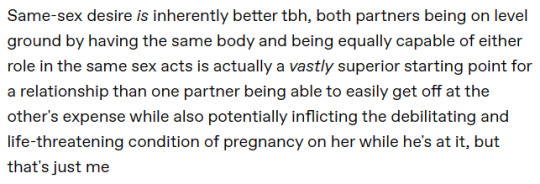

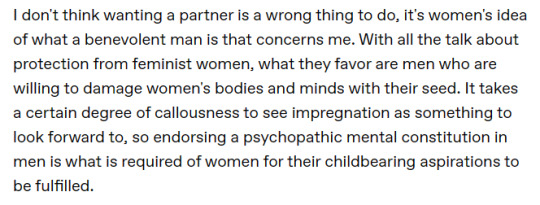
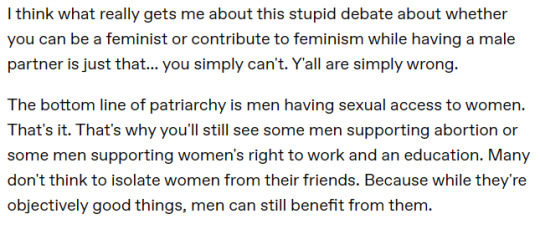
i cropped out the usernames from these posts because my intention isn’t to single out any particular users for this behavior; these posts (and similar) have many notes consisting mostly of positive feedback and support, so its safe to say that these beliefs are widely held in the radblr space. the op’s are just the ones to put pen to paper so to speak. i don’t believe some of these sentiments are harmful or bad on their own either. i actually agree with some of them, especially the first one; although note its rhetorical similarity with this section of stone's paper:
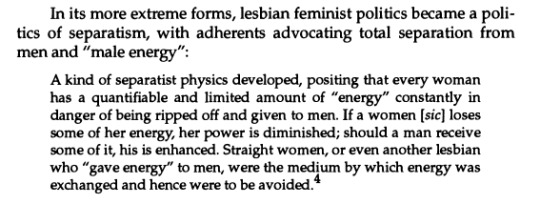
however, in aggregate (and especially in addition to commonly held stereotypes about bisexual women and lesbian women that predate radblr), they create a harmful culture that covertly encourages women to objectify their and others' sexualities for political ends, which is never going to be a good or productive thing.
choice feminists and neo-liberals have run the phrase "don't rob women of their agency" into the ground to cheaply deny the power of gendered socialization and gendered consumerism, as they are quite allegiant to these systems for a variety of reasons. so i understand the instinct from radblr to not give it any credence, but handwaving women's (including feminist-minded women's) desire for children and/or romantic relationships with men as products of solely or even primarily patriarchal brainwashing that can be undone through enough cultural/lesbian feminist re-education, which is what many radblr users espouse, is just as cheap.
for this reason, radblr is hostile to bisexual women, many of whom reject female separatism as the only means to female liberation and don't want to objectify their sexuality in service to this political goal. for this reason, bisexual women will be known as "traitors" and "fairweather." however, just as many bisexual female users believe the opposite and participate in disseminating political lesbian rhetoric (as do heterosexual and gay users). similarly, this is why radblr is toxic to lesbians who have deep friendships with men, who want to be mothers, who practice religion or don't believe in female separatism; their 'legitimacy' as lesbians is questioned, as there is the 'positive' stereotype (and key insinuation of lesbian feminism) that lesbians are naturally inclined towards feminism; and they are often accused of secretly being bisexual because these lifestyle preferences are viewed as in alignment with the patriarchy and therefore oppositional to the cultural/lesbian feminist perspective that reigns supreme in the space. radblr will not stop being biphobic (and lesbophobic) until it is free of cultural/lesbian feminist influence.
367 notes
·
View notes
Text
Idk man it’s so easy to get bogged down in all the bullshit online but when my then-6 year old cousin found out I was trans he said “ok” then corrected my grandma when she misgendered me. I was once the third between a gay man and a lesbian. Two lesbians once invited me back to their place when I presented as a man. I met an AMAB nb butch who looked strikingly to outsiders like a cis man and it was one of the more sapphic experiences I’ve had. I nervously wore a boydyke shirt to pride and got 3 different cis-looking femme folks tell me they loved my shirt. I once told a trans group at a protest that any pronouns were fine for me and one person said “wow, I’m impressed and intimidated by people like that. I don’t know that I could be that chill with pronouns.” I once told a GNC friend I wished I could wear a type of “opposite” gender clothing after I had already transitioned and so it would be associated with my AGAB and he said “You could just do it.” I’ve had cishet men fight cops for me before. The first time I had a doctor ask me if my name was different than what was on my forms I had to try not to cry. Last week, a phone call with a doctor’s office where I am generally cis passing asked unprompted if my name listed is what I want to be called. It touched me then too. I told a lesbian friend once I felt like my attraction to men AND women both felt gay. She said “makes sense.” And we moved on. I go by different pronouns in different circles. I’ve had gay women love my facial hair. I’ve had gay men like my tits. It’s all out there, I promise. It can be hard to find it but I promise there is community like you and community who likes you. And it’s more messy and beautiful than tumblr discourse makes it out to be.
86K notes
·
View notes
Text
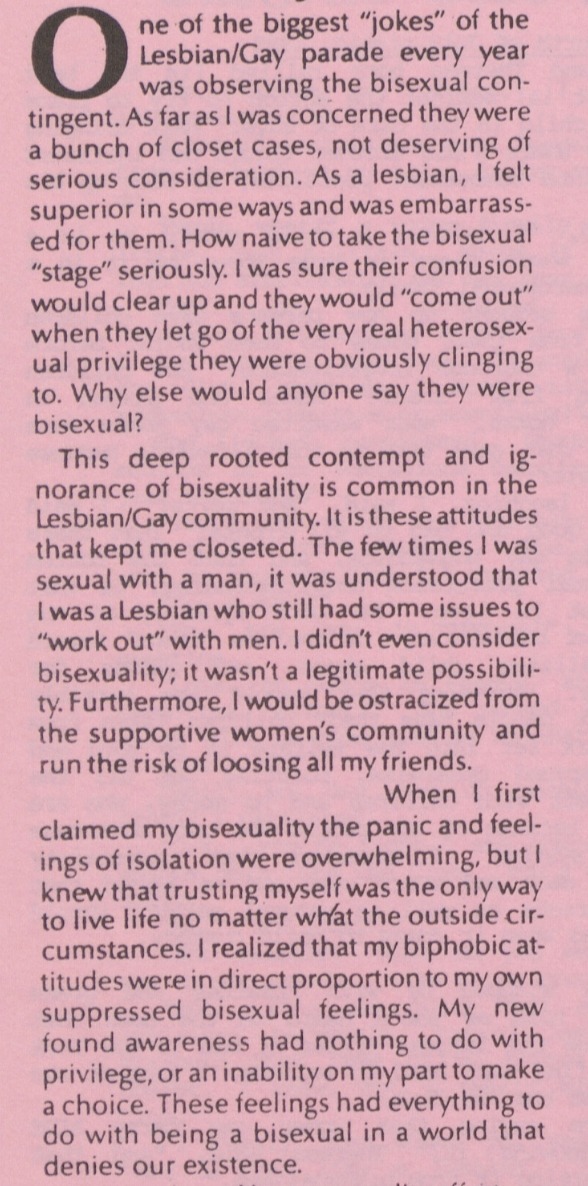
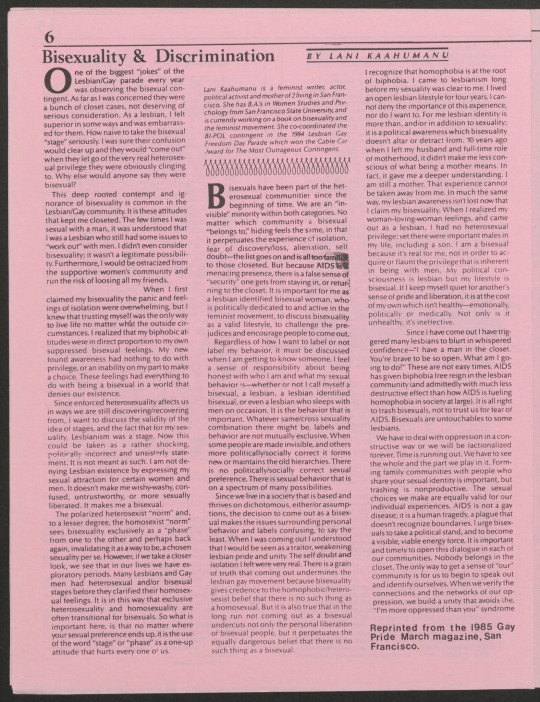
Bisexuality & discrimination by Lani Kaahumanu / 1985
2K notes
·
View notes
Text
This is what @masriyah was saying,and it's so true. Like why are we clutching pearls over hypothetical people instead of very real suffering right now?
6K notes
·
View notes
Text
I love Tumblr cuz y'all are always so ready to have in-depth conversations about important topics in the queer community like the rampant amount of biphobia, while people on Tiktok are still struggling with the idea that biphobia even exists 😭
32 notes
·
View notes
Text
Aya, what is this elusive "group chat with friends" phenomenon and how do I get in on it?
#maybe need to work on the having a friend group part first lol#but really I feel like every person I've really chatted with has had one at some point in their lives#feeling like an island over here ffs
0 notes


